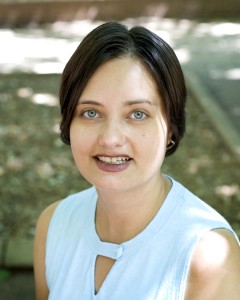The question was simple and casually asked. Maybe it was even posed rhetorically. Regardless, Farida Jalalzai has made a career out of trying to answer it.
“Why is it that there’s a prime minister who’s a woman in Pakistan, but there wasn’t a female president in the United States?”
The query, raised by one of Jalazai’s favorite undergraduate professors, sparked the interest of the then fledgling political science student. She is now an assistant professor of political science at the University of Missouri–St. Louis where she has conducted extensive research on gender’s role in politics, particularly regarding the efforts of women to achieve top national political leadership positions.
Jalalzai has published widely on the topic in prestigious journals like Politics & Gender and Journal of Women, Politics & Policy. She currently has a manuscript for a book under review. And she’s fielded interviews ranging from the San Francisco Chronicle to St. Louis Public Radio | 90.7 KWMU when Sen. Hillary Clinton was a potential presidential contender. While Clinton was the strongest woman candidate yet for U.S. president, she wasn’t able to secure her party’s nomination.
“The biggest barrier in the United States is just that it’s a very strong, dominant position in probably the strongest country in the world,” said Jalalzai, who holds a joint appointment in UMSL’s Institute for Women’s and Gender Studies. “That brings out a lot of stereotypes of what a president would have to have in terms of being a man or masculine.”
The daughter of Pakistani immigrants, Jalalzai was raised in the small upstate New York town of Gouverneur. She initially aspired to be a journalist. Through the recommendation of a professor, she took a political science course and was hooked. Soon she was traveling to her family’s native Pakistan through the federal government’s Ronald E. McNair Postbaccalaureate Achievement Program. In Pakistan, Jalalzai conducted field research on women’s participation in society, which included interviews with female members of parliament. When the time came to pick a topic for her dissertation, she thought back to her professor’s earlier question and her time spent collecting research in Pakistan.
So, what helped lead to Benazir Bhutto’s election to prime minister of Pakistan while Hillary Clinton and other women who were major party U.S. presidential candidates stalled out in the primaries?
“For one, the parliamentary system in Pakistan is more open to women,” Jalalzai said. “They also don’t have to go through the public vote to get into office.”
In fact, the prime minister of Pakistan is elected by the National Assembly, whose members are elected by the public. The parliament also requires a minimum number of seats filled by women and religious minorities.
In addition, Bhutto had strong familial ties in politics, as Jalalzai found the majority of women in executive leadership roles have had. In Bhutto’s case, her father Zulfikar Ali Bhutto had served as prime minister and president of Pakistan on separate occasions. Finally, the position was not necessarily the authoritative power. The prime minister and president often clashed, and Benazir Bhutto was twice ousted from power.
In her recent research, Jalalzai had taken note of an increase of women presidents, prime ministers and viable candidates who don’t quite make it to the top. But, as with Hillary Clinton, they’re getting closer. She said the candidates are becoming more politically ambitious, and there’s less of a lean on a familiar family name. (Yes, Hillary was preceded by Bill, but Jalalzai pointed out that might have done more harm than good.)
Some countries, including Haiti, Lithuania and Switzerland, have borne witness to multiple women executive leaders.
“There are certain countries where that glass ceiling has been shattered and they’re experiencing a snowball effect in terms of female leadership,” Jalalzai said.
She’s working on research on that too.
While gender and politics remain Jalalzai’s primary focus, she’s also studied the voting habits and level of political involvement of Muslims in the U.S. after Sept. 11, 2001. This included traveling to mosques throughout St. Louis where she interviewed Bosnian, African-American, South Asian and Middle Eastern Muslims.
Her findings were published last year in Politics and Religion. The study was loaded with a mix of quantitative and qualitative data. Many of the included anecdotes touched on the discrimination Muslims faced after the Sept. 11 attacks. In general, the study revealed a large shift in Muslims voting Republican in 2000 to voting Democrat in 2004. They also tended to become more politically involved, and the 2004 election saw a higher voter turnout.
“They didn’t make the difference in the 2008 Presidential Election, but they likely helped with the result,” Jalalzai said. “You don’t want to take that vote for granted anymore.”
More of her research on Muslims and politics is scheduled to be published next year. The focus of her published work this year will remain gender and politics.
Speaking of which, what’s it going to take for a woman presidential candidate to pass muster with American voters to become the first female president?
Jalazai expects it to be someone who is a master of foreign affairs, knows something about military defense issues and has a lot of political experience.
Just don’t expect madam president to take her seat in the Oval Office anytime soon.
“I hate to say this, but I’m thinking maybe 22 years from now,” Jalalzai said. “But I could be completely wrong because the number of strong female candidates are picking up now.
“It could be 12 years from now. But I don’t think it’ll be in the next couple (elections).”
Perhaps the more realistic expectation, Jalalzai said, is that a woman would receive the first major party nomination for president. And that, she said, would be a step in the right direction.
More information:
http://www.umsl.edu/~polisci/faculty/profiles.html#jalalzai















